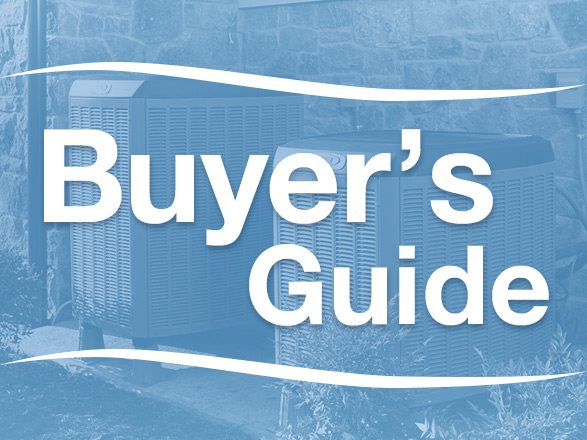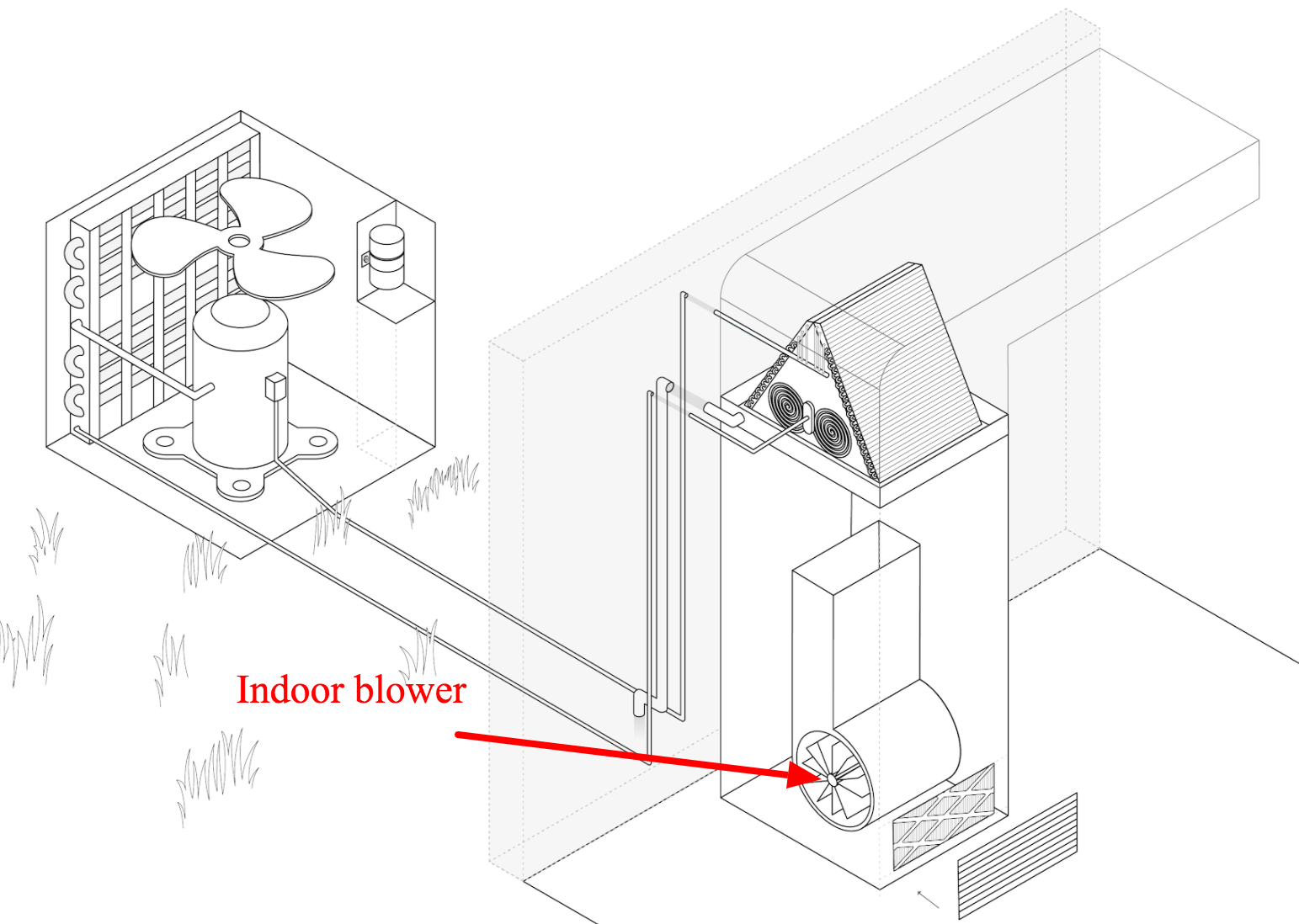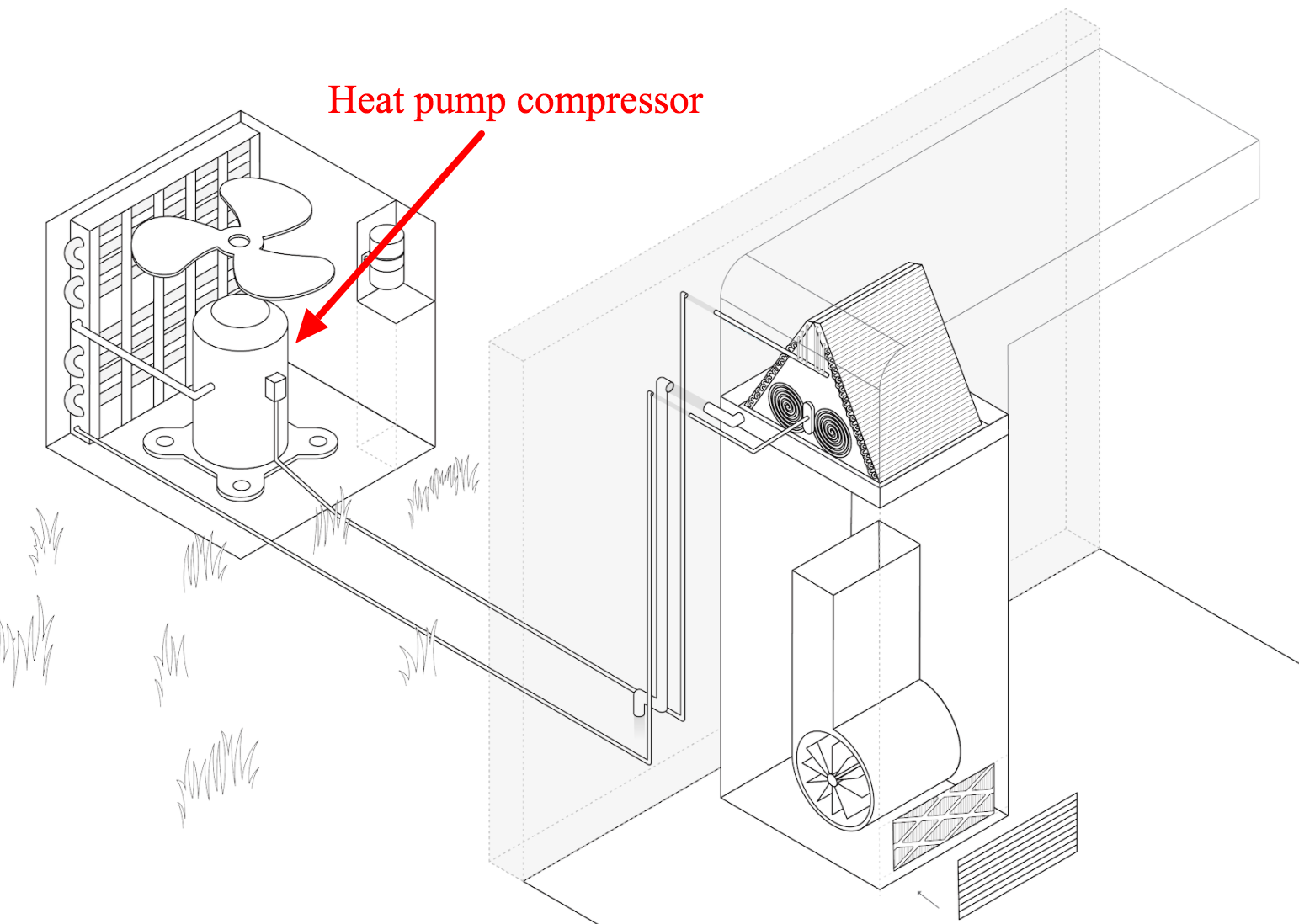What's the Cost to Install a Heat Pump in New Jersey?
November 11, 2024

Heat pumps are a great option for cost-effective heating and cooling—and, yes, they even work well throughout the brutal New Jersey winters.
But how much would it cost you to install a heat pump?
Well, the cost to install a heat pump in New Jersey can range anywhere from $4,500 to $14,000, with the average New Jersey homeowner paying $7,800.
Want a more specific price? Well, the only way to get accurate pricing is to have a professional come out for an in-home estimate (psst—we do that for FREE).
You see, a bunch of different factors affect the price of a heat pump install, including:
- The size of the heat pump
- The heat pump’s efficiency
- The blower motor type
- The compressor type
- Type of backup heating you choose
- The contractor you choose
We’ll explain each of these factors in more detail below…
Note: In this article, we’ll discuss the cost factors that apply specifically to a split-system, air-source heat pump.
Factor #1: The size of the heat pump
The “larger” the heat pump, the more expensive the unit.
But don’t get confused—heat pump sizes don’t have anything to do with the unit’s physical dimensions or weight. Instead, it refers to the unit’s “tonnage”—how much heat/cool air it can provide in an hour.
Residential heat pump sizes typically range from 1 to 5 tons. Tonnage can also be broken down into “BTU output” (which is how a lot of manufacturers list their heat pump sizes).
Here’s how tonnage relates to BTU output:
- 1-ton unit = 12,000 BTU output
- 2-ton unit = 24,000 BTU output
- 3-ton unit = 36,000 BTU output
- 4-ton unit = 48,000 BTU output
- 5-ton unit = 60,000 BTU output
Okay, so now that you know all that, here’s the really important information: You don’t get to choose the heat pump size you want.
Instead, you need to have a professional calculate your home’s “heat load” and this will determine the heat pump size you need. A heat load determines how much heating or cooling a home needs in order to maintain a comfortable temperature.
Note: A true heat load calculation takes into account a bunch of different factors and does not rely solely on the square footage of your home.
Without knowing your home’s unique heat load, you’re at risk of getting a heat pump that’s over or undersized.
And incorrect heat pump sizing can lead to:
- An undersized system that will run non-stop trying to heat/cool your home, resulting in high energy bills and frequent repairs.An oversized system that will “short-cycle”, meaning it will quickly heat/cool your home then shut off.
- An oversized system that will “short-cycle”, meaning it will quickly heat/cool your home then shut off. These abnormally short cooling/heating cycles will shorten the unit’s lifespan and result in frequent repairs.
Factor #2: The heat pump’s efficiency
The higher the SEER and HSPF rating, the more the heat pump unit will cost but the lower your monthly bills will be.
Heat pumps have 2 separate efficiency ratings:
- SEER
- HSPF
Let’s take a closer look at both of these ratings…
SEER
What it means: Seasonal Energy Efficiency Rating, this rating tells you how much cooling the unit provides compared to the amount of electricity it consumes.
Range: 13 to 27+
What SEER should you get? It depends. If you’re on a budget, go with a 14-SEER unit (this is the new federal minimum). But if you’re willing to spend more upfront for a super efficient heat pump, consider an 16-SEER unit or higher.
HSPF
What it means: Heating Seasonal Performance Factor, this rating tells you how much heat the unit provides compared to the amount of electricity it consumes.
Range: 7.7 to 12.5+
What HSPF should you get? Although the federal minimum for HSPF ratings is 8.2, we suggest getting a unit with a rating of at least 9 or 10. Because New Jersey winters can be brutal, you want to make sure that your heat pump provides efficient heating so we always suggest going a bit higher on HSPF ratings.
Note: If you’re planning to buy a heat pump soon, check out the rebates that New Jersey Clean Energy offers for high-efficiency heat pumps purchased before June 30th, 2018.
Factor #3: Blower motor type
When choosing your heat pump unit, you’ll have several “blower motor” options. This motor is located in the inside unit and controls the speed of the indoor blower.
So what does the blower motor do? Well, depending on the season, the indoor blower’s job is to:
- Suck in warm/cold air from your home
- Blow out cold/warm air into the home

But there are different kinds of blower motors and the one you pick will affect the price you pay for your heat pump unit and the blower’s speed.
The 3 heat pump blower motor types below are listed from least to most expensive:
- Fixed speed
- Multi-speed
- Variable-speed
Let’s take a look at the the difference between the options above…
- A fixed-speed blower motor allows the indoor blower to operate at 2 speeds: on and off.
- A multi-speed blower motor offers up to 5 different speeds (think super slow/slow/ medium/high/super-high settings).
- A variable-speed blower motor can ramp up or down to whatever precise speed is needed at the time.
So, yes, a variable-speed blower motor is more expensive than the others but it also provides more benefits such as:
- Using less energy (lower monthly bills)
- Quiet operation
- Better humidification (great for New Jersey summers)
- Precise and even air temperatures throughout the home
- Longer blower motor lifespan
Factor #4: Compressor type
The heat pump compressor is located inside the outdoor unit and is responsible for pumping refrigerant, a special heat-transfer substance, throughout the system.

When it comes to choosing a compressor, you have 3 options (listed below from least to most expensive):
- Single-stage compressor, which offers only 1 heating/cooling option: HIGH
- Two-stage compressor, which offers 2 heating/cooling options: HIGH or LOW
- Variable-speed compressor, which offers unlimited heating/cooling options to match the heating/cooling needs of the home.
Just like the variable-speed blower motor, a variable-speed compressor offers higher comfort, energy savings and a longer heat pump lifespan.
Factor #5: The type of backup heating you choose
Heat pumps are an extremely cost-effective way to heat your home because they simply warm your home by moving heat, not by creating it (like a furnace does).
But, because heat pumps can only move heat, their heating power is limited on super cold days, when there’s very little heat in the outdoor air to move indoors. That said, most New Jersey homeowners will need to choose a “backup” heat source for those extra cold days/nights.
Backup heat options include:
1. Gas furnace
Most New Jersey homeowners opt to install a gas furnace as their backup heat source. This heat pump/gas furnace combo is called a “dual fuel” system. Once the outside temperatures drop below a certain point, the gas furnace will automatically kick on to take over the home’s heating needs.
If you don’t already have one, installing a gas furnace can raise the overall installation price significantly. Check out our blog detailing the cost of a gas furnace installation to get a better idea of how much more this would cost.
However, compared to other backup heating sources, installing a new dual fuel system provides the most savings in the long run.
2. Electric heat strips
Most heat pumps come with small electric resistance heat strips that are activated when the heat pump loses heating capabilities in cold weather.
While using these built-in heat strips lowers the upfront installation cost, it ultimately will cost you in the long run, considering that electric resistance heating can cost 3 to 5 times more than natural gas heating.
Factor #6: The contractor you choose
The more experienced, reputable and skilled a contractor is, the higher they typically charge to install a heat pump.
Our suggestion? Don’t walk away from contractors with higher prices. Instead, do some further research to make sure that their higher price is justified and will actually be worth it.
The worst mistake you can make when it comes to your heat pump installation is to skimp on labor costs and just choose the lowest-priced contractor. By doing this, you risk having an inexperienced tech incorrectly install your heat pump—resulting in crazy high energy bills, frequent repairs and a drastically lower lifespan.
So how do you vet higher-priced, quality techs? By making sure that they:
- Work for a reputable HVAC company that’s been in business for at least 10+ years
- Are experienced in heat pump installations and repairs
- Offer a warranty on their installations
- Can offer 2–3 referrals (past heat pump installation clients that you can contact personally)
- Provide an in-home estimate in writing before any work begins
Need a heat pump installation estimate in New Jersey?
We offer FREE in-home estimates and fair, upfront quotes before any work begins. And the best part? We typically can install a heat pump in just one day.

